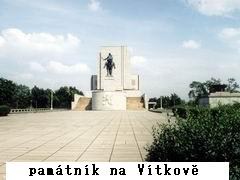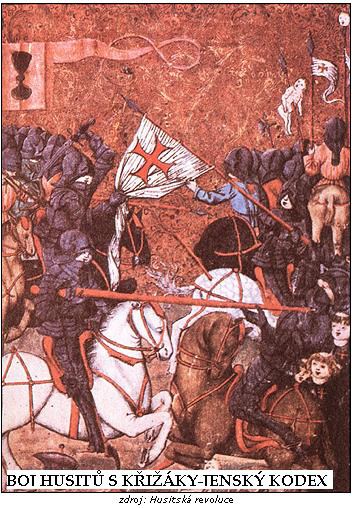jelikoz jsem husita tak tenhle prispevek ocenuji jednickou :) moc pekne
The Hussite period
Categories: Years of war and revolution
HUSITIAN TIME
Introduction
The Hussite period is one of the most important parts of our history, It is credited with the origin of the Czech Reformation, the foundations of which were laid by Master Jan Hus. It was a great contribution to the European spiritual heritage, and on this scale we can compare ourselves with such nations as England and France. But this era also has many downsides. The biggest problem is the different interpretations of the Hussite wars themselves, which even in the 19th century had an impact on Czech-German relations and played a large role in modern Czech historiography.
František Palacký (the founder of modern historiography) regarded the Hussite period as the peak of national history, but in the eyes of manyIn the eyes of many critics, he judged the Hussite Revolution too uncritically and at the same time made artificial and purposeful connections with contemporary socio-political reality. Palacký's view of Hussitism was supported by Masaryk himself and the group around him, who sought in Hussitism inspiration for the future in the struggle for humanity. The third current came from the Catholic Church itself, which denied any Hussite legacy as an upset to the continuity of the Czech lands. Masaryk promoted a vision of Huss's legacy, which was also evident after the establishment of the First Republic. After the arrival of the totalitarian regime, the legacy was fully politicized and the Hussite revolution was perceived as a struggle of the common people against the oppressors (nobility).
The number of supporters of the Hussite reform grew rapidly and the Czechs began to venerate Hus as a Christian martyr. From the year 1410 Hussitism began to spread beyond Prague, eventually reaching all towns and villages. The peak of the Hussite movement was between the years 1414-1419. The symbol of the Hussites became the chalice. From 13th century the custom of priests receiving a consecrated host at Holy Communion, which is transformed into the body and blood of Jesus Christ during the ceremony, became established in the Western Church.
The war period had catastrophic consequences, absolute economic collapse, exports and imports from abroad were interrupted, the value of the coin dropped significantly, which was also caused by the weakening of mining in Kutná Hora. The bad economic development could not be reversed even at the beginning of the 16th century. Several faculties were closed and part of the university community was expelled, this caused a catastrophic decline in education.
In the years 1421-1424 14 churches were destroyed in Bohemia and Moravia Benedictine monasteries and 18 rectories, killing approximately 674 monks and nuns. In addition, Hussite troops destroyed 16 Premonstratensian monasteries, where perhaps 575 monks and nuns died. Cistercian 33 monasteries and rectories were destroyed and 3,884 monks and nuns were killed. The Augustinians lost 40 monasteries and 450 members of the order. 44 Minorite monasteries, 37 Dominican monasteries and 3 other monasteries of other orders were also devastated, in total 550 monks and nuns were killed. The sacking of monasteries continued in 2nd half of the 15th century.
The Hussite era began with the Fifteen Years' War, in which the Hussite Bohemians (thanks to their brilliant leaders, militarytraining and enthusiasm) sometimes defeated their opponents with marvellous victories, but in the end, due to circumstances, they achieved only a fraction of what they had fought for. Their successes, however, were usually associated with irreparable damage. After Wenceslaus IV, the legitimate heir to the throne was Sigmund, King of Rome and Hungary. The Bohemians, however, had long known his cruelty and meanness, especially from the crimes he had committed against his brother Wenceslaus.
The highlight, however, was the letter of safe-conduct and return which he gave to Huss in Constance. He then revoked the letter himself and advised Hus to be burned. Sigmund did not lend as an instrument to the Council and the Pope to carry out their intention that the heretical Bohemians should return to the Church or be exterminated. The more resolute were preparing for war immediately after the death of Wenceslaus.

The fight has begun 14 November 1419 in Prague with the expulsion of the royal garrison from the Lesser Side. The Catholics and most of the Hussite nobility intended to accept Sigismund as king, although he made religious concessions instead of, which some of the Caliphs had asked of him, with the pope's permission, he proclaimed in Wrocław in March 1420 crusade against the heretics.
Žižka had already defeated the lords at Nekmír and Sudomír, was founding a new fortress at Tabor, and was training an army with which, when Sigismund besieged Prague, he won a decisive victory over him on Mount Vitkov (Žižkov) 14. Sigismund contented himself with being crowned king of Bohemia, which took place 28 July, disbanded the crusader army and was again defeated November 1, 1420when he tried to capture Vyšehrad, besieged by the Hussites.
The Hussites advanced victoriously in many places against his side, he retreated in March 1421 Bohemia. The Prague and Tabor people united and conquered many towns, occupied the offices and converted them to their faith and party, and the castles of the kingThey ravaged the castles and monasteries, and took possession of the estates of their conquered adversaries for their towns. Thus Hussitism and the resistance against Sigismund gained 1421 ...decisive preponderance in Bohemia.
The Second Crusade of this year arrived in Bohemia in various ways: The Germans from Žatec were repulsed fiercely, before Sigismund took Kutná Hora, and was finally defeated by Žižek there and on the run at Habry and Německý Brod (Havlíčkův Brod). January 6-10, 1422. The third military expedition in October 1422 ended even worse and ended without a real defeat, it did not even reach Karlštejn, which it wanted to liberate from the Prague inhabitants.
Despite all the victories, the Hussites failed to achieve peace with foreign enemies or an orderly government at home. They tried to get the king from the Jagiellonian family, ruling in Poland and Lithuania.
 V May 1422 Sigmund Korybutovich came to Bohemia only as an administrator with the little power the Hussites had ceded to him, there was no thought of restoring state unity with the other countries of the Bohemian crown. When the extreme danger had passed, the Hussites quarrelled among themselves over the different degrees of deviation from the Catholic faith and orders.
V May 1422 Sigmund Korybutovich came to Bohemia only as an administrator with the little power the Hussites had ceded to him, there was no thought of restoring state unity with the other countries of the Bohemian crown. When the extreme danger had passed, the Hussites quarrelled among themselves over the different degrees of deviation from the Catholic faith and orders.
When Korybutovich was in March 1423 recalled from Bohemia to Poland, the Praguers allied themselves with the king's party against the Tabors, but Zizek defeated 20 April 1423 the lords at Hořice and, after a short-lived reconciliation, the Praguers at Malesov. 7 June 1424then reconciled with the Praguers and died at Přibyslav on a joint campaign into Moravia. 11 October 1424.
Korybutovich returned to Prague in June 1424, but when he tried to unite the Hussites with the Great Church, he was imprisoned by the Praguers. There was no hope of the peace the people wanted. After the great slaughter of the Germans who invaded Ústí nad Labem. 16 June 1426Prokop Holý became the leader of the Camp troops.
His accession is associated with a change in Hussite policy. He combined military expeditions to neighbouring areas with negotiations with representatives of the Roman Church, imperial feudal lords and Sigismund of Luxembourg. However, the Hussites failed to get their demands through atBasel and the devastated country needed a rest.
It is true that the Hussites were victorious, but the cost of victory was too great. The armies completely devastated the countryside, the Hussites burned churches, monasteries and towns. People were starving because food was scarce and negotiations between Hussites and Catholics did not lead to an agreement. The radical Hussites wanted to fight on, and the young people knew nothing but to fight!!!
You can search for artefacts from this time using our metal detectors.
Continued next time..................
The article is included in categories:










